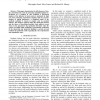Free Online Productivity Tools
i2Speak
i2Symbol
i2OCR
iTex2Img
iWeb2Print
iWeb2Shot
i2Type
iPdf2Split
iPdf2Merge
i2Bopomofo
i2Arabic
i2Style
i2Image
i2PDF
iLatex2Rtf
Sci2ools
CDC
2010
IEEE
2010
IEEE
Tuning a synthetic in vitro oscillator using control-theoretic tools
Abstract-- This paper demonstrates the effectiveness of simple control-theoretic tools in generating simulation-guided experiments on a synthetic in vitro oscillator. A theoretical analysis of the behavior of such system is motivated by high cost, time consuming experiments, together with the excessive number of tuning parameters. A simplified model of the synthetic oscillator is chosen to capture only its essential features. The model is analyzed using the small gain theorem and the theory of describing functions. Such analysis reveals what are the parameters that primarily determine when the system can admit stable oscillations. Experimental verification of the theoretical and numerical findings is carried out and confirms the predicted results regarding the role of production and degradation rates.
CDC 2010 | Control Systems | Simple Control-theoretic Tools | Small Gain Theorem | Vitro Oscillator |
| Added | 13 May 2011 |
| Updated | 13 May 2011 |
| Type | Journal |
| Year | 2010 |
| Where | CDC |
| Authors | Christopher Sturk, Elisa Franco, Richard M. Murray |
Comments (0)

